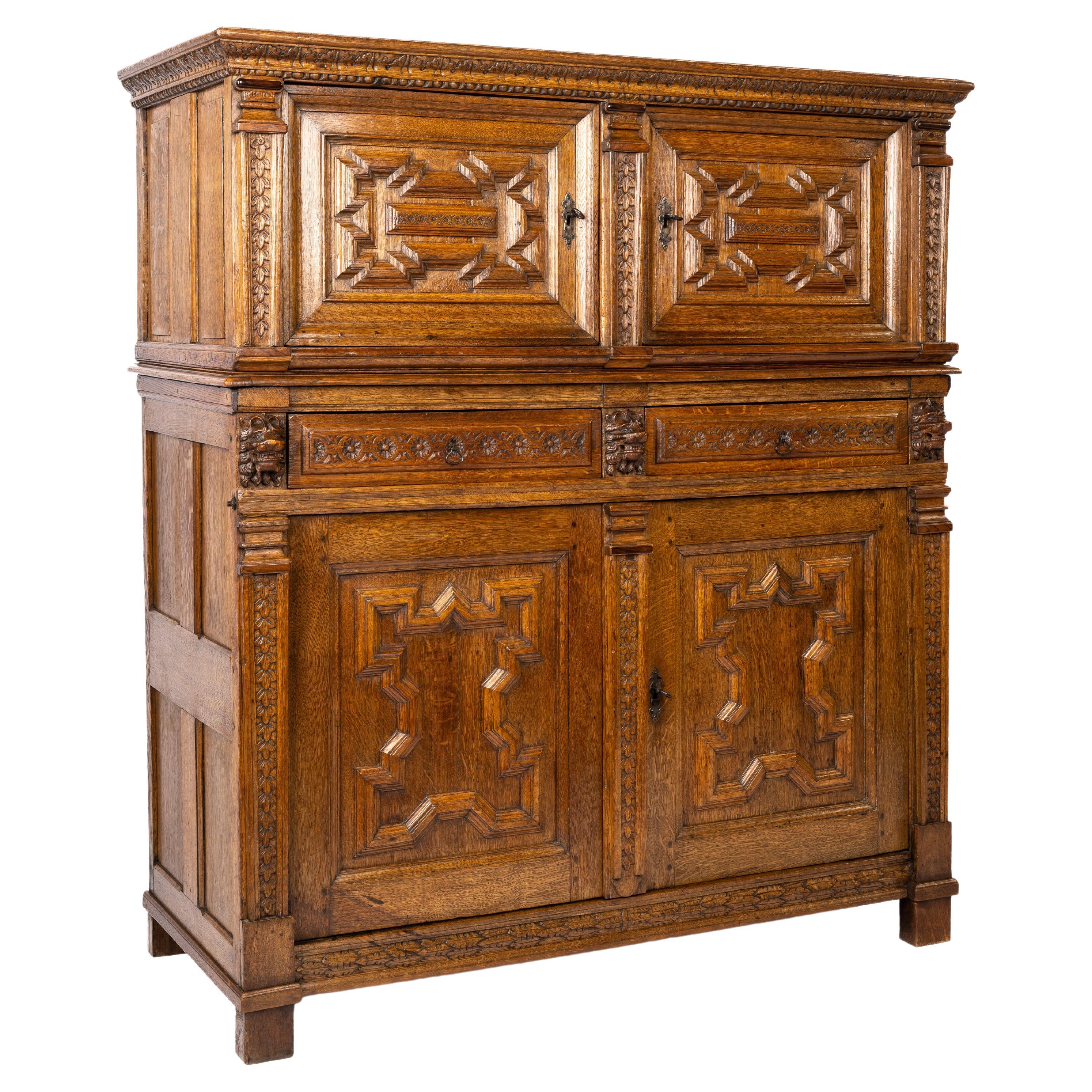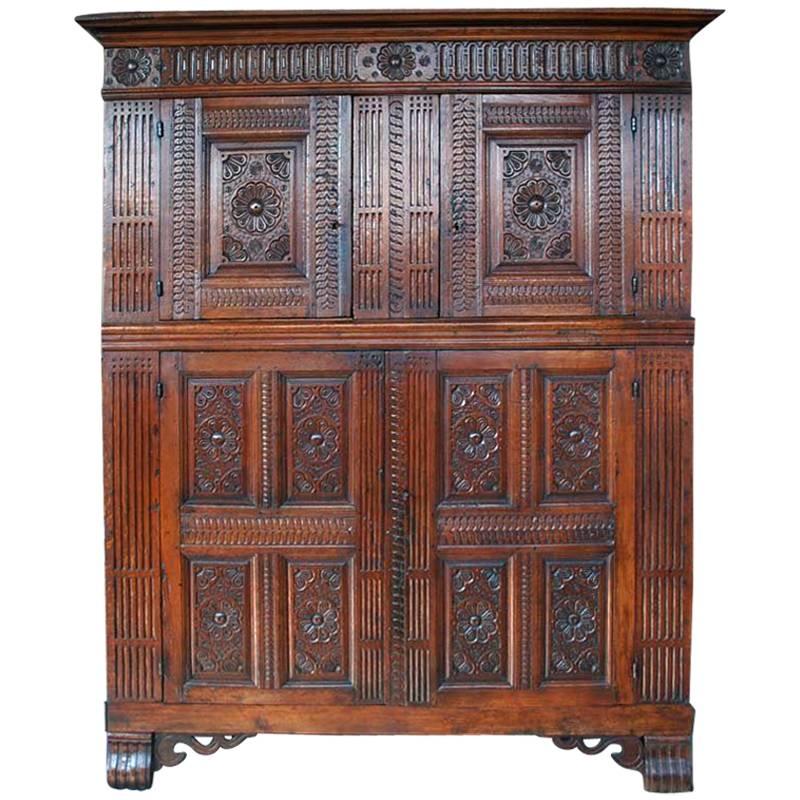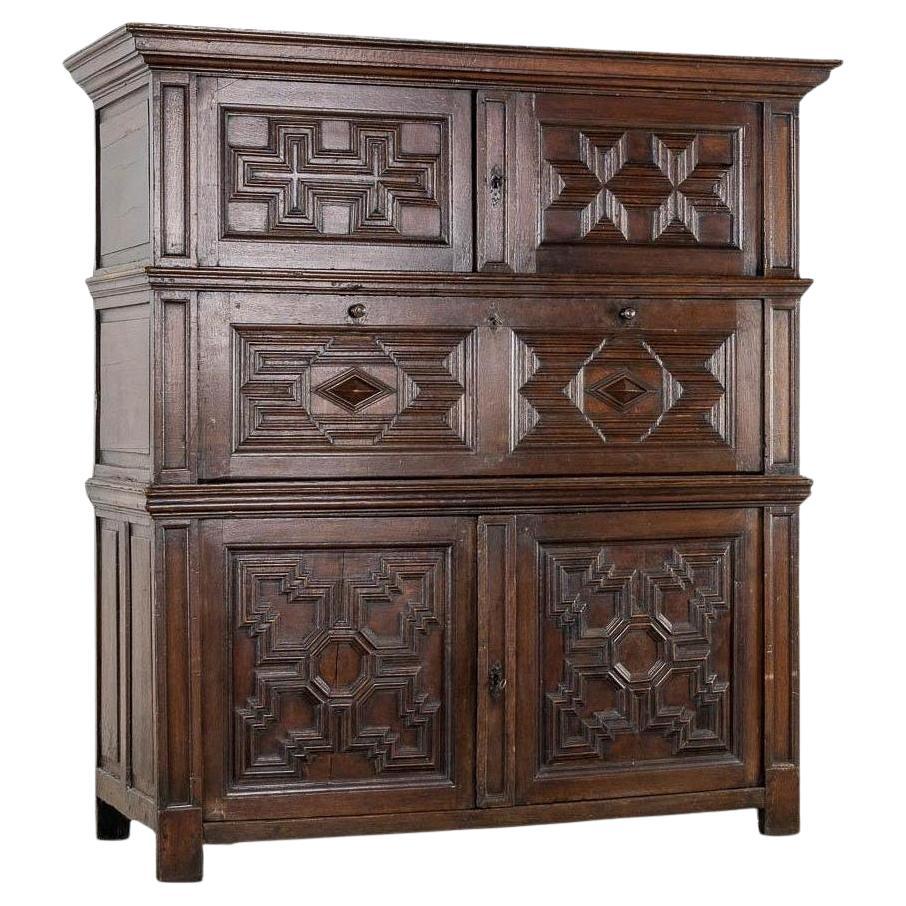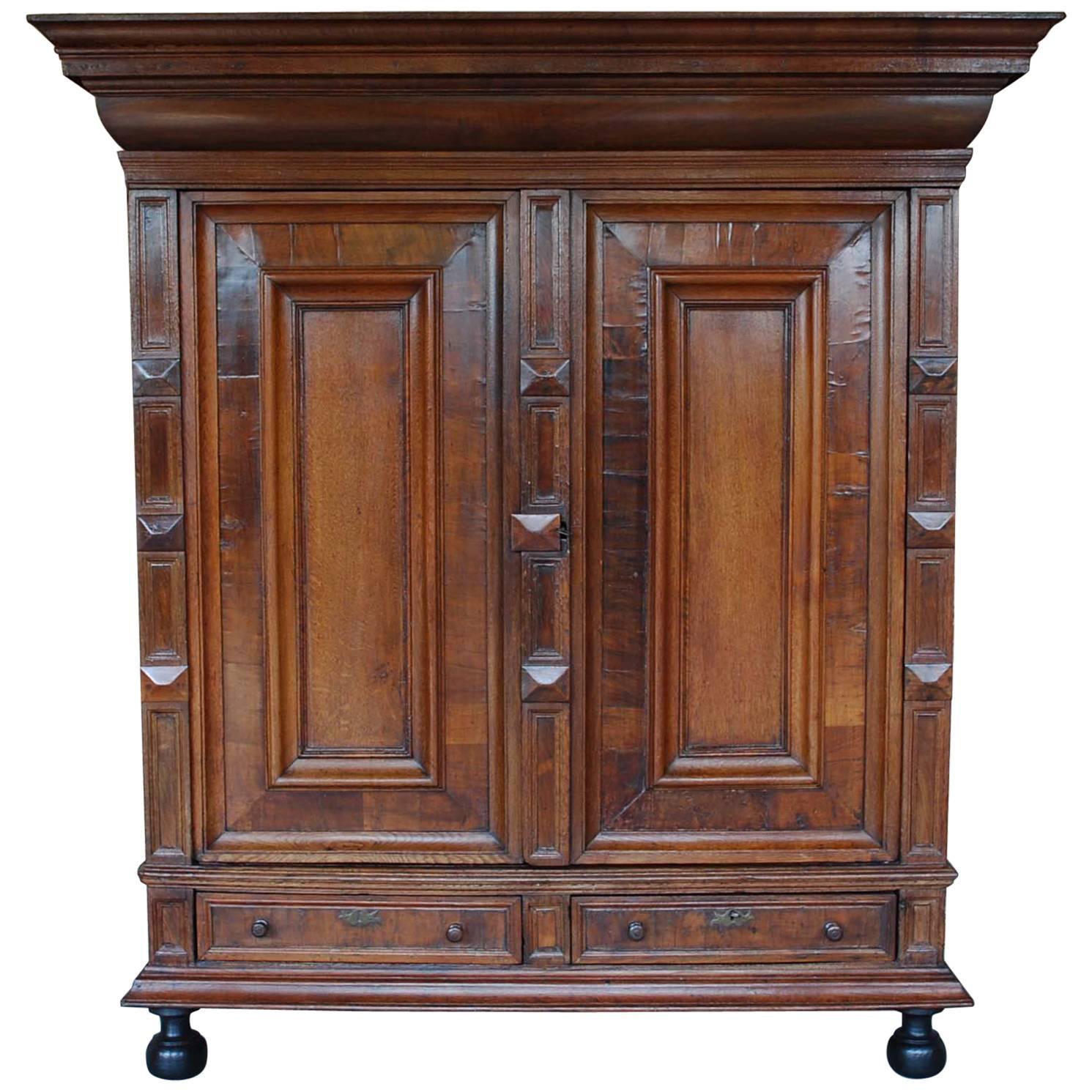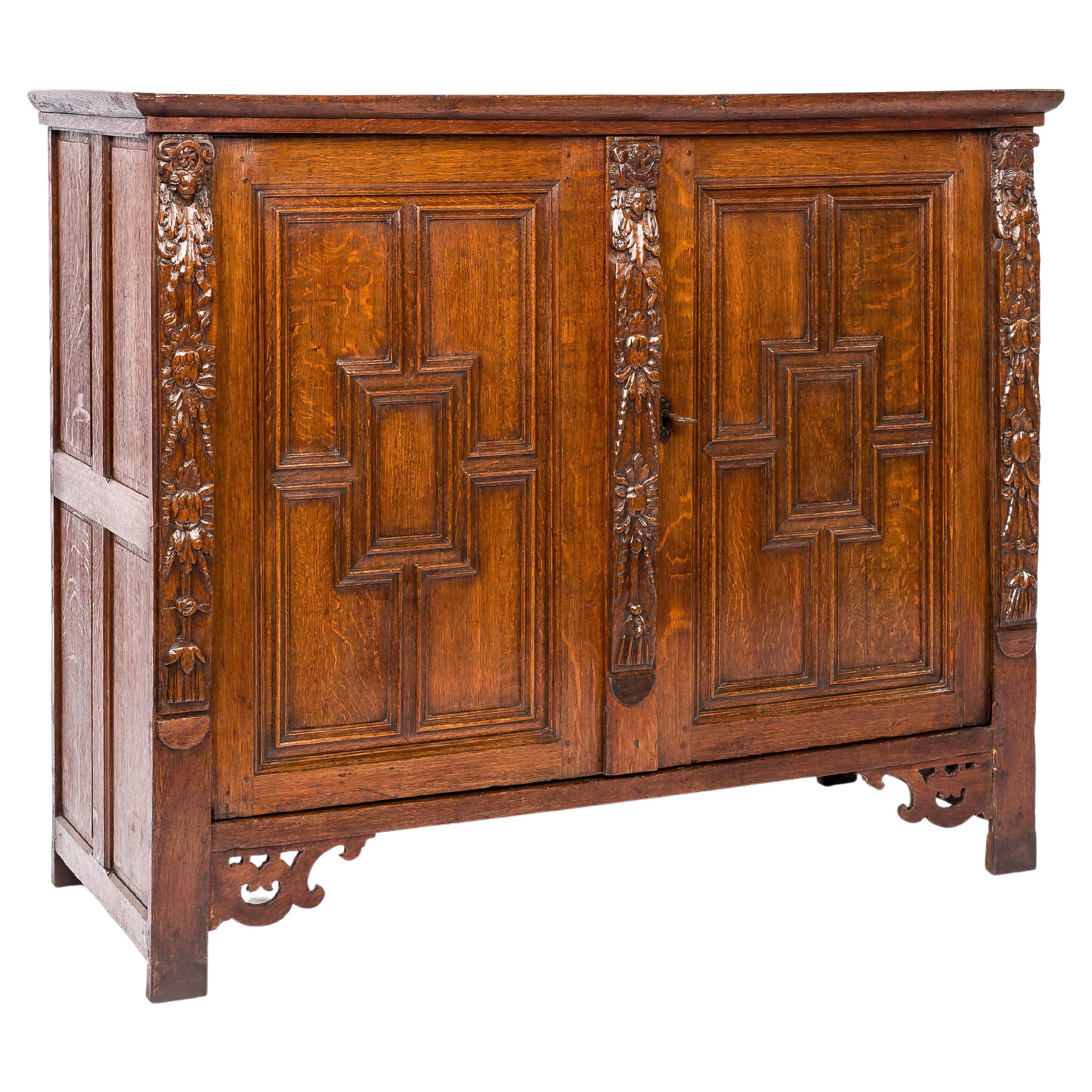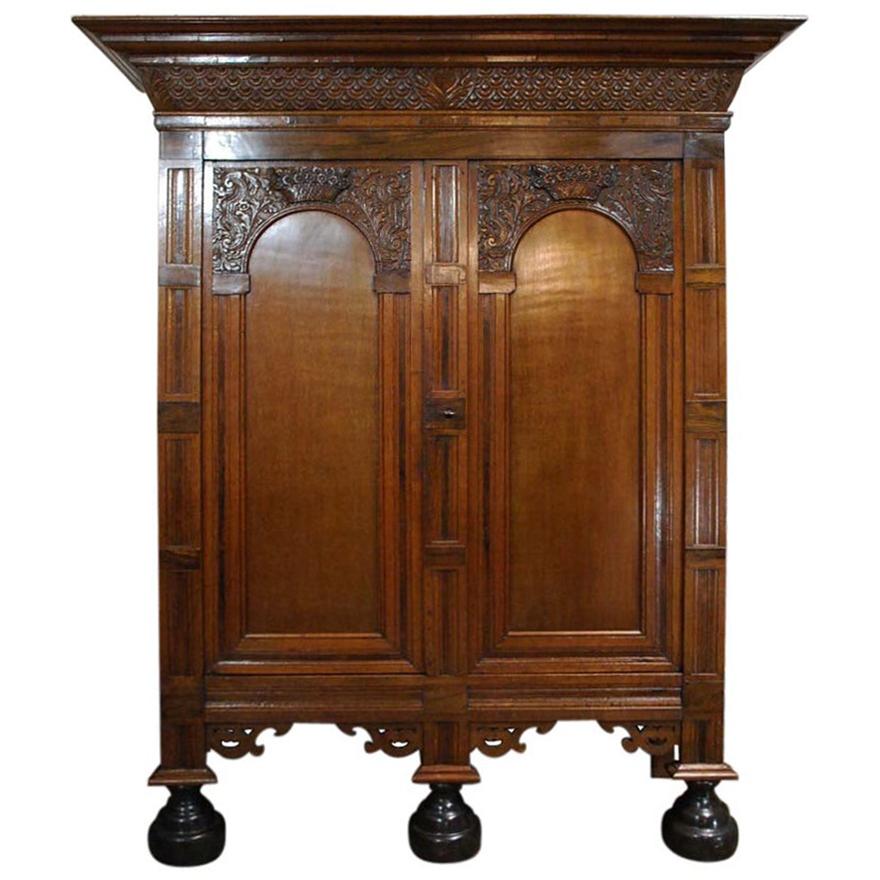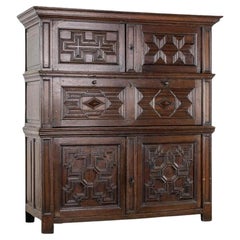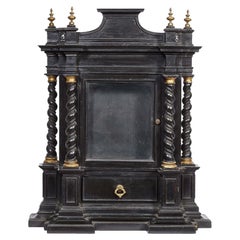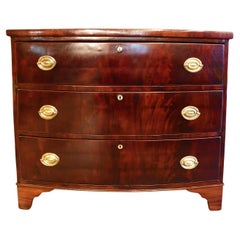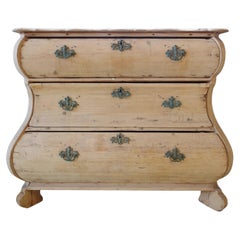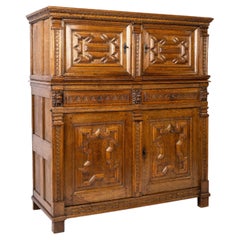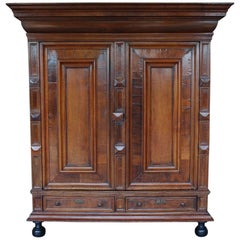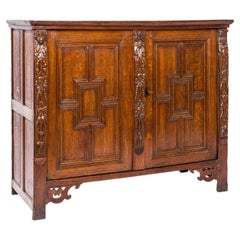Items Similar to Monumental 17th century Richly Ornamented and Coffered Flemish Oak Cabinet
Want more images or videos?
Request additional images or videos from the seller
1 of 16
Monumental 17th century Richly Ornamented and Coffered Flemish Oak Cabinet
$12,995
£9,801.59
€11,320.93
CA$18,206.89
A$20,245.02
CHF 10,598.63
MX$247,296.67
NOK 133,182.25
SEK 125,284.60
DKK 84,509.97
About the Item
Anonymous
Belgium; early-to-mid-17th century
Oak, Iron mounts
Approximate size: 77.5 (h) x 72 (w) x 26 (d) in.
This monumental 5-door Flemish oak cabinet features a remarkably carved repertoire of traditional patterns, geometric forms, medallions, lions’ masks and angelic caryatids.
Below the elaborate and richly carved overhanging cornice are three cupboard doors surmounting two larger cupboard doors along the lower portion of the cabinet. The doors are handsomely carved with geometric coffered motifs, incuse medallions, and lion masks in protruding relief. The doors are secured by four iron lock plates with their accompanying keys.
The magnificent ornamentation of this cabinet is the result of French influences in Flanders and the delectable tastes of preceding cultural infusions from Spain and Northern Italy. Centers of production for these cabinets were in Antwerp, Brussels, Kortrijk, Ghent, Bailleul, Bergues and Saint-Omer. The majority of production for these cabinets can be traced to the third quarter of the 17th century although earlier examples are known, possibly inclusive of the present example which tends to relate to the productions of the second quarter of the 17th century. Regrettably, the lack of surviving data on these workshops or the artists who participated in them is scant to non-existent.
Cabinets such as the present one, would have been owned by the bourgeoisie in the 17th century and used to house practical housewares such as dishes, books or food.
Similar examples of this craftsmanship can be observed in the publication: ‘Mobilier de Belgique et de la Flandre Française.’ See also: Odile Canneva-Tétu, ‘Le mobilier domestique à Lille au XVIIe siècle,’ exhibition catalog.
Condition commensurate with age. Minor scuffs and dings throughout. The surfaces of several lion masks are heavily rubbed with minor losses and wear to portions of the surface area. Some restorative work may be present on the interior shelving. The iron bosses above the caryatids may be a later addition. There may have also once been iron or metal appliques affixed to the cabinet doors, adjudged by old mounting holes.
Please note, this item ships from our storage facility in Belgium and will require additional time to pack and ship to the USA. Anonymous
Belgium; early-to-mid-17th century
Oak, Iron mounts
Approximate size: 77.5 (h) x 72 (w) x 26 (d) in.
This monumental 5-door Flemish oak cabinet features a remarkably carved repertoire of traditional patterns, geometric forms, medallions, lions’ masks and angelic caryatids.
Below the elaborate and richly carved overhanging cornice are three cupboard doors surmounting two larger cupboard doors along the lower portion of the cabinet. The doors are handsomely carved with geometric coffered motifs, incuse medallions, and lion masks in protruding relief. The doors are secured by four iron lock plates with their accompanying keys.
The magnificent ornamentation of this cabinet is the result of French influences in 18th century Flanders and the delectable tastes of preceding cultural infusions from Spain and Northern Italy. Centers of production for these cabinets were in Antwerp, Brussels, Kortrijk, Ghent, Bailleul, Bergues and Saint-Omer. The majority of production for these cabinets can be traced to the third quarter of the 17th century although earlier examples are known, possibly inclusive of the present example which tends to relate to the productions of the second quarter of the 17th century. Regrettably, the lack of surviving data on these workshops or the artists who participated in them is scant to non-existent.
Cabinets such as the present one, would have been owned by the bourgeoisie in the 17th century and used to house practical housewares such as dishes, books or food.
Similar examples of this craftsmanship can be observed in the publication: ‘Mobilier de Belgique et de la Flandre Française.’ See also: Odile Canneva-Tétu, ‘Le mobilier domestique à Lille au XVIIe siècle,’ exhibition catalog.
Condition commensurate with age. Minor scuffs and dings throughout. The surfaces of several lion masks are heavily rubbed with minor losses and wear to portions of the surface area. Some restorative work may be present on the interior shelving. The iron bosses above the caryatids may be a later addition. There may have also once been iron or metal appliques affixed to the cabinet doors, adjudged by old mounting holes.
Please note, this item ships from our storage facility in Belgium and will require additional time to pack and ship to the USA. PleaAnonymous
Belgium; early-to-mid-17th century
Oak, Iron mounts
Approximate size: 77.5 (h) x 72 (w) x 26 (d) in.
This monumental 5-door Flemish oak cabinet features a remarkably carved repertoire of traditional patterns, geometric forms, medallions, lions’ masks and angelic caryatids.
Below the elaborate and richly carved overhanging cornice are three cupboard doors surmounting two larger cupboard doors along the lower portion of the cabinet. The doors are handsomely carved with geometric coffered motifs, incuse medallions, and lion masks in protruding relief. The doors are secured by four iron lock plates with their accompanying keys.
The magnificent ornamentation of this cabinet is the result of French influences in 18th century Flanders and the delectable tastes of preceding cultural infusions from Spain and Northern Italy. Centers of production for these cabinets were in Antwerp, Brussels, Kortrijk, Ghent, Bailleul, Bergues and Saint-Omer. The majority of production for these cabinets can be traced to the third quarter of the 17th century although earlier examples are known, possibly inclusive of the present example which tends to relate to the productions of the second quarter of the 17th century. Regrettably, the lack of surviving data on these workshops or the artists who participated in them is scant to non-existent.
Cabinets such as the present one, would have been owned by the bourgeoisie in the 17th century and used to house practical housewares such as dishes, books or food.
Similar examples of this craftsmanship can be observed in the publication: ‘Mobilier de Belgique et de la Flandre Française.’ See also: Odile Canneva-Tétu, ‘Le mobilier domestique à Lille au XVIIe siècle,’ exhibition catalog.
Condition commensurate with age. Minor scuffs and dings throughout. The surfaces of several lion masks are heavily rubbed with minor losses and wear to portions of the surface area. Some restorative work may be present on the interior shelving. The iron bosses above the caryatids may be a later addition. There may have also once been iron or metal appliques affixed to the cabinet doors, adjudged by old mounting holes.
Please note, this item ships from our storage facility in Belgium and will require additional time to pack and ship to the USA. Please contact us about facilitating shipping. We have incorporated some of this cost already into the offer price.
- Dimensions:Height: 77.5 in (196.85 cm)Width: 72 in (182.88 cm)Depth: 26 in (66.04 cm)
- Style:Baroque (Of the Period)
- Materials and Techniques:
- Place of Origin:
- Period:Early 17th Century
- Date of Manufacture:unknown
- Condition:Wear consistent with age and use.
- Seller Location:Leesburg, VA
- Reference Number:1stDibs: LU8166241485412
About the Seller
4.7
Vetted Professional Seller
Every seller passes strict standards for authenticity and reliability
Established in 2013
1stDibs seller since 2023
44 sales on 1stDibs
Typical response time: 1 hour
- ShippingRetrieving quote...Shipping from: Bruxelles, Belgium
- Return Policy
Authenticity Guarantee
In the unlikely event there’s an issue with an item’s authenticity, contact us within 1 year for a full refund. DetailsMoney-Back Guarantee
If your item is not as described, is damaged in transit, or does not arrive, contact us within 7 days for a full refund. Details24-Hour Cancellation
You have a 24-hour grace period in which to reconsider your purchase, with no questions asked.Vetted Professional Sellers
Our world-class sellers must adhere to strict standards for service and quality, maintaining the integrity of our listings.Price-Match Guarantee
If you find that a seller listed the same item for a lower price elsewhere, we’ll match it.Trusted Global Delivery
Our best-in-class carrier network provides specialized shipping options worldwide, including custom delivery.More From This Seller
View AllAn impressive early 18th century Dutch oak geometric kussen cabinet with integra
Located in Leesburg, VA
An impressive early 18th century Dutch oak geometric kussen cabinet with integral secretaire
Anonymous
Belgium or Southwestern Netherlands; probably first quarter of the 18th centur...
Category
Antique Early 18th Century Belgian Baroque Wardrobes and Armoires
Materials
Brass
An early 18th century Florentine Ebonized Wood Aedicule Case
Located in Leesburg, VA
An early 18th century Florentine ebonized wood aedicule case with gilt metal embellishments
Ambit of Leonard van der Vinne
Possibly first decade of the 18th century; Florence, Italy
Approximate size: 83.5 (h) x 69 (w) x 23 (d) cm
The cabinet’s centralized glass door is flanked by thick spiraling Solomonic columns surmounting a lower drawer. To the rear of the cabinet, the motif repeats in an eloquent display of perspectival treatment. The overall work is supported by a tiered base, elegantly conceived, and the cabinet is topped by a handsome pediment flanked by square plinths crested by gilt metal finials and an openwork frieze.
The cabinet’s tempered and moderate form suggests an origin probably during the first decade or quarter of the 18th century. Although utilitarian in concept, the reserved and sublime expressiveness of this cabinet is managed with a quality and care respective of the influence of Florentine ebony cabinetry work conceived in the Galleria dei lavori or Grand Ducal Workshops of the 18th century Medici dynasty. In particular, its base mouldings echo a remarkable Night Clock...
Category
Antique Early 18th Century Italian Baroque Vitrines
Materials
Brass
Massachusetts Mahogany Regency Bow Front Dresser, ca. 1800
Located in Leesburg, VA
Massachusetts Mahogany Regency Bow Front Dresser, ca. 1800
Anonymous
Boston, MA; ca. 1800
Mahogany, brass.
Approximate size: 33.5 (h) x 35.5 (w) x ...
Category
Antique Early 1800s American Regency Commodes and Chests of Drawers
Materials
Brass
19th century Antique Stripped Finish Dutch Serpentine Commode
Located in Leesburg, VA
19th century Antique Stripped Finish Dutch Serpentine Commode
Approximate size: 32.5 (h) x 41.5 (w) x 23 (d) in.
Anonymous
The Netherlands; 19th century
Wood, brass.
A striking 19...
Category
Antique 19th Century Dutch Rococo Revival Commodes and Chests of Drawers
Materials
Brass
Pair of Late 18th century Cerulean Blue painted Italian Cupboards
Located in Leesburg, VA
Anonymous
Possibly Florence, Italy; 18th century
Wood, iron
Approximate size: 37 (h) x 48 (w) x 21 (d) in. each
These Late 18th-century Italian cupboards stand as a captivating tes...
Category
Antique Late 18th Century Italian Rococo Cupboards
Materials
Pine
18th Century Neo-Classical Italian Carved, Painted and Gilt Wall Panel
Located in Leesburg, VA
Anonymous
ca. 1790; Italy
Wood panel and plaster, painted, gilt and lacquered
Approximate size: 118.5 x 82.5 x 5 cm
The present panel is probably of late 18th century origin,...
Category
Antique Late 18th Century Italian Neoclassical Wall-mounted Sculptures
Materials
Wood, Giltwood
You May Also Like
Antique 17th Century Dutch of Flemisch Honey Color Oak Rennaisance Cupboard
Located in Casteren, NL
This fantastic two-piece 17th-century oak cupboard was made in Antwerp, Flanders, circa 1680. It consists of two pieces, a lower and an upper cabinet. The lower cabinet can be used w...
Category
Antique 1680s Dutch Renaissance Cabinets
Materials
Oak
$15,764 Sale Price
20% Off
17th Century Flemish Hand-Carved Oakwood Cabinet
Located in Casteren, NL
17th century flemish hand-carved oakwood cabinet.
Originates Belgium, dating approximately 1680.
Category
Antique Late 17th Century Belgian Cabinets
Materials
Oak
$12,897 Sale Price
20% Off
Dutch 18th Century Renaissance Oak and Walnut Cupboard
Located in Casteren, NL
This mid-18th century cabinet is a so called 'kussenkast' or pillow cabinet.
The pillow refers to the shape of the raised panels in the doors. It is a ...
Category
Antique Mid-18th Century Dutch Renaissance Cabinets
Materials
Oak
Antique 17th century Flemish solid brown oak Renaissance Carmelite cupboard
Located in Casteren, NL
On offer here is an Exquisite 17th Century Oak Two-Door Cabinet from the Carmelite Monastery in Bruges, Belgium. This antique piece, crafted in the Southern Netherlands around 1635, ...
Category
Antique Early 17th Century Belgian Renaissance Cupboards
Materials
Steel
$7,356 Sale Price
20% Off
Antique Dutch Renaissance Oak Cabinet
Located in Casteren, NL
This extraordinary cabinet is made of the finest oak in the tradition of the Dutch Renaissance during the “Dutch golden age”
This cabinet is made in ...
Category
Antique Early 18th Century Dutch Renaissance Cabinets
Materials
Oak
French late 16th century Renaissance Walnut Deux-Corps cabinet
Located in Troy, NY
Beautiful French Renaissance cabinet in two parts. The top part with two carved doors featuring classical figures opening to an interior fit...
Category
Antique 16th Century French Renaissance Cabinets
Materials
Walnut
More Ways To Browse
17th Century Ship
Antique Oak Furniture Prices
Antique Metal Ornaments
17th Century Italian Plates
17th Century Lion
Baroque Cabinet Oak
Belgian Oak Cabinet
17th Century Italian Cabinet
Lion Medallion
Iron Door Lock
Antique Doors Belgium
French Baroque Cabinets
17th Century French Cabinet
Antique Boss
Used Metal Storage Cabinet With Lock
Carved Caryatid
Spanish Oak Cabinet
Belgian Lion
